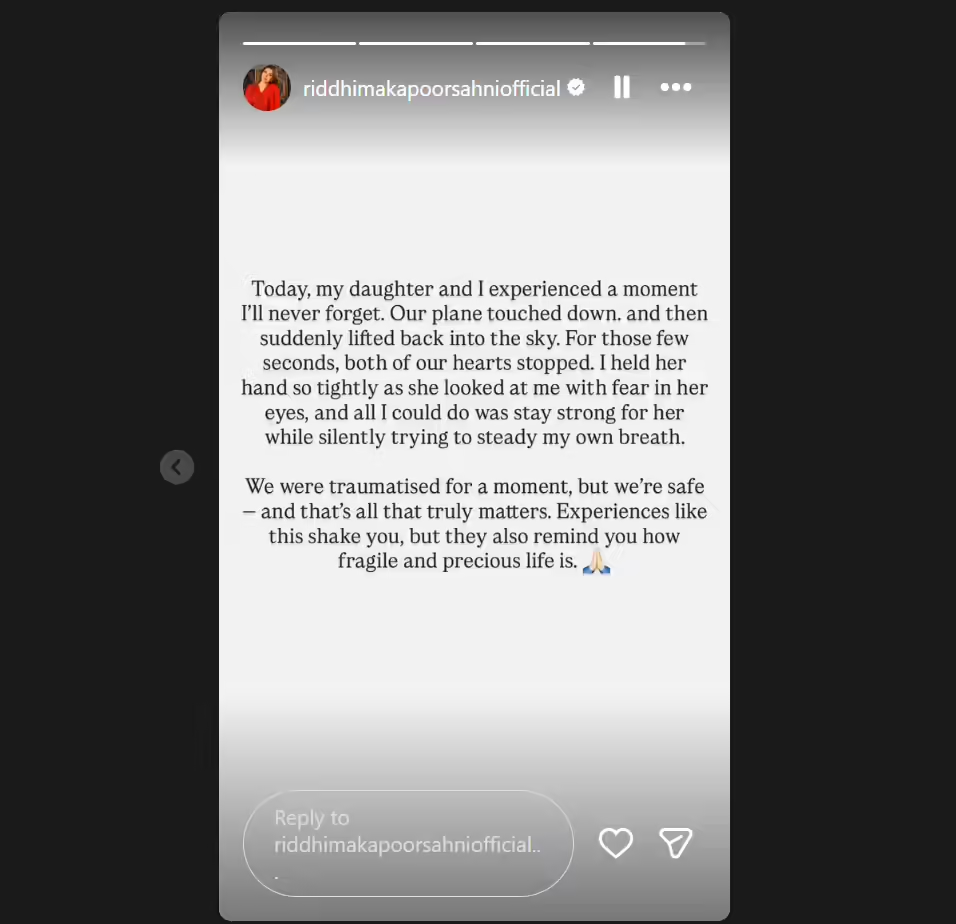The extended Kapoor family, one of the most prominent dynasties in Indian cinema, was recently rattled by a frightening incident involving Riddhima Kapoor Sahni, the sister of Bollywood superstar Ranbir Kapoor, and her daughter, Samara Sahni. The mother-daughter duo experienced a deeply unnerving mid-air scare during a commercial flight, a moment Riddhima candidly shared with her followers, stressing the intense psychological impact of an emergency aviation manoeuvre. The incident, which took place just hours before her social media post, has sparked a conversation about the human element of flight safety, even when protocols are correctly followed.

Unplanned Ascent: The Terrifying ‘Go-Around’ Experience
The harrowing moment unfolded during the final phase of their flight, as the aircraft was attempting to land. Riddhima, an accomplished fashion designer and daughter of the late, revered actor Rishi Kapoor, recounted the experience on her Instagram Stories. For the general public, the final moments before touchdown are usually marked by a sense of calm and relief. However, for Riddhima and Samara, this moment was violently interrupted. She described the sequence of events with chilling clarity: “Today, my daughter and I experienced a moment I’ll never forget. Our plane touched down and then suddenly lifted back into the sky.”
This sudden, unplanned ascent after making contact with the ground is technically known as a ‘go-around’ or an ‘aborted landing’. While pilots are expertly trained to execute this procedure—which is purely a safety decision—it creates an instant and profound sense of panic among passengers. The engines roar to full thrust, the aircraft pitches up aggressively, and the comforting deceleration expected during landing is instantly reversed into a powerful acceleration akin to take-off. Riddhima vividly captured the terror, stating that for those few seconds of uncertainty, “both of our hearts stopped.”
The anxiety was further amplified by the presence of her young daughter, Samara. As a parent, Riddhima’s immediate instinct was to manage her child’s fear while grappling with her own. She admitted to holding Samara’s hand “so tightly as she looked at me with fear in her eyes,” forcing herself to “stay strong for her while silently trying to steady my own breath.” This narrative of a celebrity mother battling a universal, gut-wrenching fear resonated strongly, making the incident highly relatable across the country.
Aviation Safety Standards in the Indian Context
The go-around manoeuvre is a non-negotiable part of aviation safety. In a vast country like India, where the aviation industry is booming and major hubs handle flights in the lakhs annually, the probability of conditions necessitating a go-around increases. For example, major airports like those in Delhi and Mumbai operate at near-peak capacity, and a marginal delay in a preceding aircraft clearing the runway or an unexpected crosswind could trigger the need for the procedure.
The decision to execute a go-around is a testament to the stringent safety culture mandated by the Directorate General of Civil Aviation (DGCA) and the professionalism of Indian flight crews. It occurs when a pilot deems the landing conditions unsafe, which might be due to wind shear, poor visibility, or runway incursions. For instance, a foreign object or an unannounced vehicle on the runway, although rare, demands an immediate and decisive action. While it feels like an emergency to the passenger, the pilots view it as a necessary, controlled action to maintain the highest level of safety. This event, therefore, should be viewed not as a failure, but as a success of the ‘safety first’ protocol. The lives of hundreds of passengers, including members of the renowned Kapoor family, were ultimately secured by the pilot’s swift and accurate judgement.
The Emotional Aftermath and Ranbir’s Family Bond
The trauma of the incident was palpable in Riddhima’s subsequent reflection. She admitted that while they were safe, the experience was profoundly jarring, noting, “We were traumatised for a moment, but we’re safe and that’s all that truly matters.” She concluded by stating that such experiences “shake you, but they also remind you how fragile and precious life is.”
The welfare of Riddhima, Samara, and the entire family is always a matter of public interest, especially given the high profile of her brother, Ranbir Kapoor, and her mother, veteran actress Neetu Kapoor. The bond between the siblings is well-known, with Riddhima often seen supporting her younger brother and his family, including his wife Alia Bhatt and their daughter, Raha Kapoor. News of any scare impacting this close-knit family always draws national attention.
Furthermore, this ordeal occurs shortly after Riddhima was praised for her quieter, humanitarian actions. She had recently earned widespread respect for discreetly assisting veteran character actor Sudhir Dalvi with his medical bills, as he was hospitalised with severe sepsis. When questioned by online trolls, she maintained that helping someone in need was a “blessing, not something done for attention,” reflecting the compassionate values instilled by the family matriarch, the late Krishna Raj Kapoor, and her parents. Her philanthropic effort, which helped raise what would be considered several lakh rupees for the veteran, stands in sharp contrast to the sheer helplessness felt during the flight scare, highlighting the duality of control in life—the ability to act generously versus the need to surrender to aviation forces.
Conclusion
The terrifying mid-air event, which involved a standard but shocking go-around manoeuvre, serves as a sharp reminder of the unpredictability of travel, even for prominent figures like Ranbir Kapoor’s sister, Riddhima Sahni. Although the incident was brief and ended without harm, the emotional distress was real. Ultimately, the successful execution of the safety protocol ensured the safe arrival of the mother-daughter duo, reinforcing the faith placed in India’s highly skilled aviation sector and the value of professional training.
